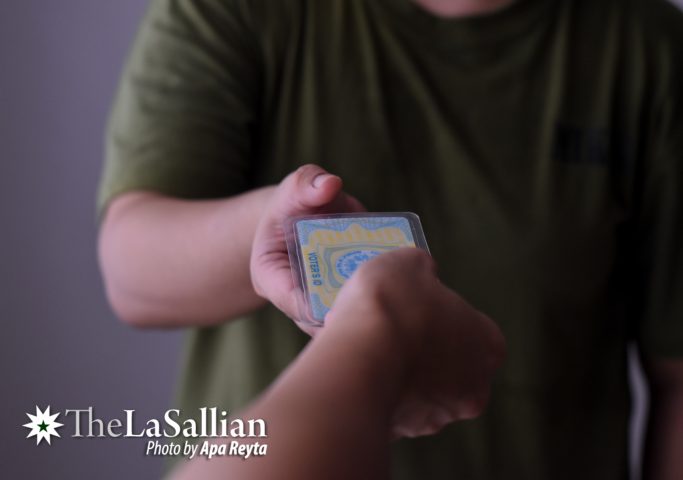
Despite calls for a postponement of voter registration due to the ongoing COVID-19 pandemic, the Commission on Elections (Comelec) has resumed accepting applications after a five-month delay last September 1 in areas not under Enhanced Community Quarantine (ECQ) or Modified ECQ.
Comelec, however, has implemented extensive safety procedures to comply with public health measures. Face masks and face shields must be worn while inside registration centers; mandatory temperature-checking will be done upon entry; and a limited number of applicants are allowed per day to maintain physical distancing.
The added protocols, however, did not deter individuals like Eirence Encisco (II, BEED-ECED) from registering. She is one of over four million new voters that Comelec expects would register for the 2022 national and local elections. With government disarray and indecisiveness amid the COVID-19 pandemic, she believes that voting has become important “now, more than ever”.
A ‘democratic right’
University Student Government Vice President for External Affairs Ronin Leviste shares his firm belief that the Lasallian community plays a role in choosing better leaders, pressing students to take the initiative and register. “[The] potential impact of Lasallians in the upcoming elections is huge,” he argues, saying the community can “greatly affect local elections and maybe even [on a] national setting.” Leviste warrants, however, that such impact can “only go as far as [voters] take it”.
Leviste’s office took strides last Term 1 to open satellite voter registration sites on University grounds—a project held in collaboration with Comelec’s National Capital Region office. The project produced more than 2,079 newly registered voters from among students, faculty, and staff. However, quarantine measures had restricted campus
access, barring any opportunities to reinstate the project.
But the interruption did not extend to voter registration sites nationwide; Comelec Education and Information Director and Spokesperson James Jimenez divulges that there was “never any question” on whether or not Comelec would resume voter registrations, but rather, it was more of a concern on how local offices would institute safety guidelines amid the COVID-19 pandemic. “Depriving four million people of the chance to participate in [such] governance,” according to him, would be “unconscionable” as voting is a “democratic right”.
Despite being under times of uncertainty, Eliza Adviento (II, BS-AEC), a registered voter, still heavily advocates for youth participation in voter registration. Using her social media platforms, Adviento encourages her peers to continue the fight for social justice and political awareness. For her, securing the state of democracy of the country boils down to practicing the right to vote. “With all that’s happening right now, voting is a necessity,” she says. “If we want change, we must actively pursue it. I believe that voting is that act.”
Adjusting to the times
Although the pandemic forced institutions and agencies to enforce proper health protocols, “the process of registration hasn’t changed much,” Jimenez describes. What has changed, however, is the inclusion of safety precautions.
Registrants are required to fill out a Coronavirus Self Declaration Form to state whether a registrant has experienced any COVID-19 symptoms. They may opt to print out and fill in these forms prior to visiting the local offices, or formally, the Office of the Election Office.
“We [also] instituted an appointment system that would make it easier for people to actually get served once they’re at the registration center,” Jimenez explains.
Unfortunately for Comelec, applicant compliance continues to be their “biggest challenge”. He shares, “We still have instances where people print using onion skin bond paper [for their] application forms, which obviously just won’t do.”
Comelec’s efficiency was also bogged down due to health measures. “We are simply operating at below capacity—way below capacity. I think less than 50 percent in some places,” Jimenez laments, adding that this has made registration times take an “average [of] about 20 to 30 minutes per person”.
This turtle-like pace has agitated applicants, Jimenez admits, “You see people patiently waiting in the grocery store, but replace the grocery store with the Comelec, and suddenly they’re all impatient and angry that you’re not letting them in.”
The commission is trying to address these problems through constant coordination with each municipality’s local law enforcement. Jimenez shares that the municipalities have been disseminating information on application requirements and procedures, while Comelec continues to post announcements on social media.
However, Jimenez expects the real challenge to start in the latter months of voter registration; with people continuing to register—on top of constant delays in their application and registrants failing to comply with provisions—subsequent bottlenecking will only become more evident. He shares that the Comelec is actually working on undisclosed “online alternatives” that could increase registration efficiency and turnout, which he hopes can be pushed “online [as soon as] next year”.
